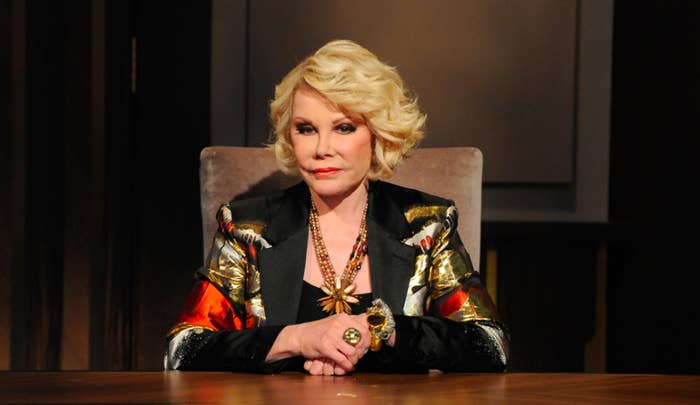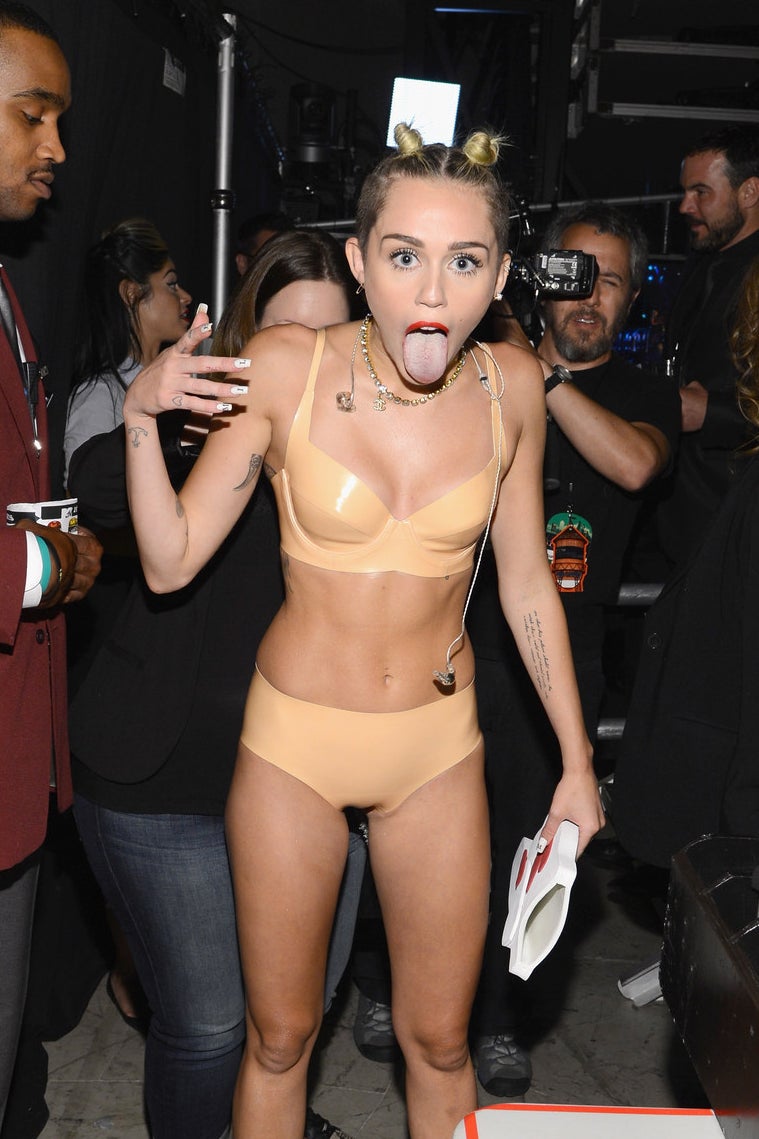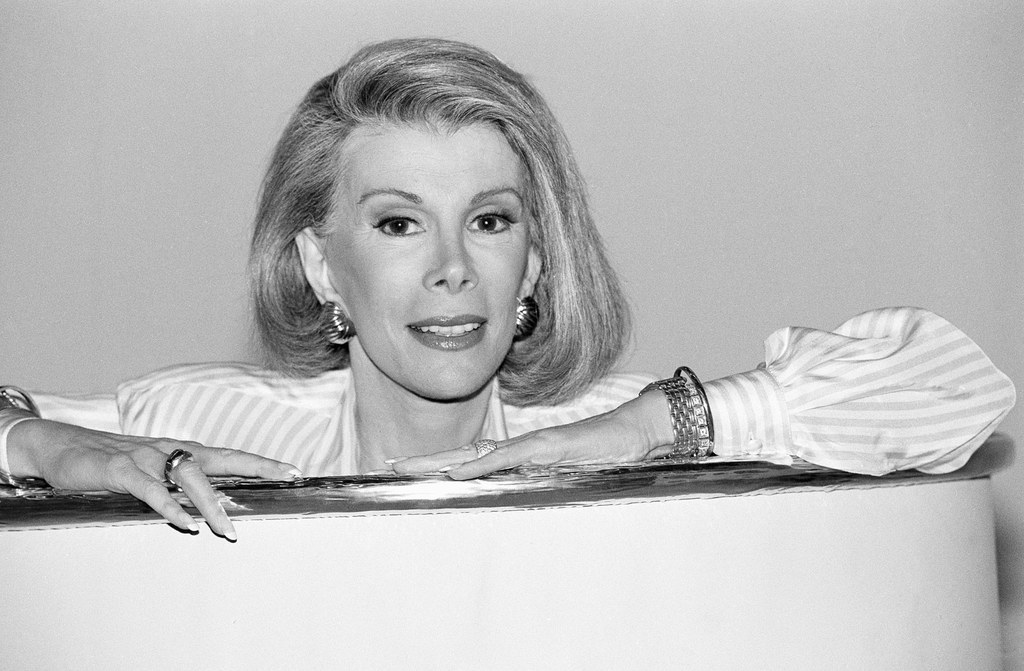
Joan Rivers worked very hard to seem like an asshole — which is the highest compliment I can offer her. For five decades, she made a career out of being everything we teach women not to be: Superficial, rude, bitter, angry, selfish. She portrayed herself as simultaneously over- and under-sexed, simultaneously vain and ugly. She was intensely abrasive, respectful of no one and nothing, and consciously, inventively, relentlessly cruel. Little girls might be made of sugar and spice, but Joan Rivers — the public version of her, anyway — was made of rage, venom, and implants. And she liked it that way. She lived to deflate and disrupt the ideal of "nice" girls.
View this video on YouTube
Joan Rivers on the Ed Sullivan Show, 1967.
As much as Rivers did for women in comedy, she also angered and hurt a whole lot of people. When she died, she was being protested by supporters of Palestine for saying that dead Palestinians "deserve to be dead." (She later clarified that she meant "Hamas," but that certainly wasn't what she said, and she was so passionately pro-Israel that there's good reason to believe she meant every word.) She had also recently called Michelle Obama a "tranny."
And that's just the tip of the iceberg: Any overview of her work uncovers racist jokes, transphobic jokes, an abundance of cruel jokes about rape and rape victims, not to mention a ton of not-so-clever jokes about fat women. (The punchline, usually, was that they were fat, and ate food a lot, resulting in their fatness. Surprise!)
But the big problem with Rivers' bigotry is that it undermined the truly radical, beautiful elements of her cruelty. It wasn't just that her statements were offensive: It was that, when she was trying, and going after targets that were worthy of her scorn, she could do so, so much better.
She was the bane of celebrity culture, appearing at the entertainment industry's most self-congratulatory gatherings in order to puncture all of the glitz and spin with her loud, relentless refusal to take it at face value. Joan Rivers on the red carpet was like the uninvited fairy at Sleeping Beauty's christening, casting a curse on the kingdom that would dare reject her: Having fun without me, everyone? Well, that's about to change.
Celine Dion’s asking $72 million for her Florida home. For that you get 5 bathrooms and the promise of never hearing the Titanic song again.
Miley Cyrus bought $20,000 in Dior lingerie after wearing it at a shoot. She loves it so much, she might start wearing panties every day.
Her best burns were piercingly specific; she had a talent for reading media narratives and PR spin, and could simultaneously sum up and demolish a celebrity's public image in a single sentence. Witness, for example, the astonishing brevity of one take on her nemesis Gwyneth Paltrow: "So chic. You know why there's no one standing near her? Vegan farts." It sums up the entirety of Paltrow's personal brand — an elegant, health-obsessed ice princess — then punctures it by forcing us to contemplate the wreckage an all-kale diet must inflict on even the most elegant of digestive systems.
Rivers was the daughter of immigrants, had gone bankrupt, and survived her blacklisting largely through her formidable work ethic — she did everything from cruise ship gigs to penis enlargement ads; "I'll write for Hitler for $500," she told NPR — and, tellingly, some of her best jokes revolved around money. For example, her take on child-star siblings Dakota and Elle Fanning: "Elle says she and Dakota are 'normal sisters' who just go to school and play together…In their six-hundred-room mansion on the island they own." Even that Miley gag revolves around class; on one level, it's an easy joke about how often Cyrus poses nude. But primarily, it's about the fact that Miley Cyrus — a girl whose rowdy, pot-smoking, gosh-y'all vulgarity makes her seem like she should never be more than 10 yards away from a tray of Jell-O shots — has an extra 20 grand to spend on fucking designer lingerie.
Yes, our culture is set up to devote vast amounts of money and attention to good-looking 22-year-olds with a high school education, Rivers' act seemed to say. But, for the love of God: Did we actually have to take them so seriously? Rivers refused the idea that she was a bad person for refusing to massage celebrities' egos, or further the aims of their publicists. Her cruelty toward celebrities and the culture that adored them was, like her rudeness in talking about abortions and sexual double standards, a way of speaking truth to power: Wealthy child stars are, by definition, not "normal." No one could possibly enjoy the kind of oppressively healthy diet that Gwyneth Paltrow shills. And Miley Cyrus does not need $20,000 worth of Parisian lingerie; Miley Cyrus doesn't even seem like the kind of person who would do her own laundry often enough to reliably have clean underwear.


Rivers spoofs Miley's 2013 Video Music Awards look.
Larry Busacca/Getty Images for MTV (Cyrus), courtesy of E! Online via Twitter (Rivers).
Rivers' offensive material never attained the specificity and intelligence of her entirely character-based work. Why on earth would anyone call President Obama "gay?" It has no echoes or roots in his public perception, his media narrative, his persona; it's just an empty insult, more or less on par with the comments on any given YouTube video. Calling Michelle Obama a "tranny" doesn't illuminate anything specific about her character, or puncture any pretense or hype: All it does is to drum up some vague, racist, sexist ideas of an assertive black woman as "unfeminine" and mannish. Similarly, when Rivers got started on the fat jokes — Elizabeth Taylor put mayonnaise on aspirin; Adele should change "Rolling in the Deep" to "Rolling in the Deep Fried Chicken," etc. — she seemed to be stuck attaching the same generic insult (likes food) to different women, with slightly different phrasing. It might have seemed "edgy," but it was profoundly lazy. Fat women don't need a professional comedian to tell them they eat too much; they can hear it from any given asshole on a street corner.
I want to remember the disruptive Joan Rivers. I want to see her as the smart woman who wasn't afraid to scare people; who knew the conventions of traditional femininity well enough to break them all at once, who lived to break the rules of what "nice girls" could do, whose jokes could illuminate either the constrictions of femininity or the hollowness of fame. I want to think of Joan Rivers as primarily a woman whose cruelty was a form of resistance, directed to a culture that tried to shut her up or box her in. I will remember that version of her. But I'll also remember the jokes she missed, the things she screwed up, the fact that she could go for the lazy, easy joke — the one that appealed to power, and to oppressive structures, by telling them that fat women were ugly, and black women weren't feminine, and liberal men were "gay" — as often as she went for the jokes that broke that system down.
When Joan Rivers was an outsider, looking in, there was no one like her. It's when she was the insider, the person in power, looking down at the rest of us, that she failed to live up to her own legacy. It's a shame. Just think of how funny she'd have been if she were always punching up.



